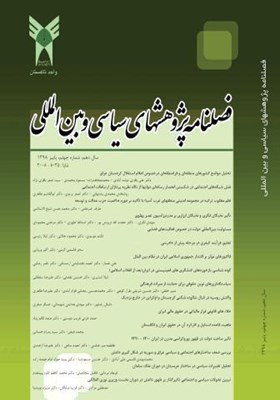تعلیق فرآیند کیفری در مرحله پیش از دادرسی
محورهای موضوعی : مجله پژوهش های سیاسی و بین المللی
کلید واژه: عدالت کیفری, تعلیق تعقیب, فرآیند کیفری, میانجی گری, ترک تعقیب,
چکیده مقاله :
سحر قاسمی گرمی[1]- اکبر وروایی[2] تاریخ دریافت: 26/5/1398- تاریخ پذیرش: 28/7/1398 چکیده: تعلیق فرآیند کیفری از مباحث مهمی است که به منظور عدم دخالت حقوق کیفری یا مداخله حداقلی آن در فرآیند رسیدگی، مورد توجه صاحب نظران حقوق کیفری قرار گرفته است. هدف اصلی پژوهش تبیین تعلیق فرآیند کیفری، در مرحله قبل از صدور حکم بوده و در جهت پاسخ به این ﺳﺆال می باشد که چه شرایط و آثاری بر نهادهای تعلیق کیفر در مرحله پیش از دادرسی حاکم است؛ این مرحله به لحاظ آن که هنوز برچسب مجرمیت بر بزهکار الصاق نگردیده، از اهمیت شایانی برخوردار است، تا با به کارگیری سیاست جنایی کارآمد و متناسب نمودن تعقیب و رسیدگی با شخصیت مرتکب، از توالی فاسد برچسب زنی بر شخص و درگیر نمودن وی در سیستم عدالت کیفری جلوگیری به عمل آید؛ البته نباید از این امر غافل بود که آن چه قانون را در سرنوشت مرتکبان جرایم و جامعه ﻣﺆثر می سازد، رویکرد مثبت یا منفی قضات و حقوق دانان نسبت به نهادهای جدید است و قاضی به هنگام اعمال قواعد حقوقی باید به محتوای ارزشی آنها و این که اجرای آن ﺗﺄمین کننده عدالت می باشد یا نه توجه کند. [1]- دانشجوی دکتری، حقوق جزا و جرم شناسی، واحد کرمانشاه، دانشگاه آزاد اسلامی، کرمانشاه، ایران (گروه حقوق جزا و جرم شناسی ، واحد علوم و تحقیقات کرمانشاه، دانشگاه آزاد اسلامی، کرمانشاه، ایران) srghi@yahoo.com [2]- استاد تمام و عضو هیئت علمی، دانشگاه علوم انتظامی امین، تهران ، ایران (نویسنده مسئول) dr.akbarvarvaei@yahoo.com
Aahar Ghasemi Germi[1], Akbar Varvaei[2], Abstract: The suspension of the criminal process is one of the important issues that have attracted the attention of criminal law experts in order to prevent its criminal law from being interfered with at least in the proceedings. The main objective of the research was to explain thesuspension of criminal proceedings in the pre-sentence phase and is in response to the question of what conditions and effects exist on foundations of the suspension of sanction in the pre-trial phase. This stage is important because the criminal offenses have not yet been attached to the criminal, so that by employing an effective and criminal policy and tailoring the prosecution to the perpetrator, the corrupt labeling of the person and his involvement in the criminal justice system is prevented; It should not be overlooked, however, that what makes a law effective in the fate of perpetrators and in society is the positive or negative attitude of judges and jurists towards new institutions, and the judge should apply their legal content when applying legal rules and such, whether or not its implementation provides justice. [1]. Ph.D. Student of Criminal Law, Department of Criminal Law and Criminology, Kermanshah Branch, Islamic Azad University, Kermanshah, Iran. [2]. Full Professor and Faculty Member, Amin Police Science University, Tehran, Iran (Corresponding Author)
_||_

